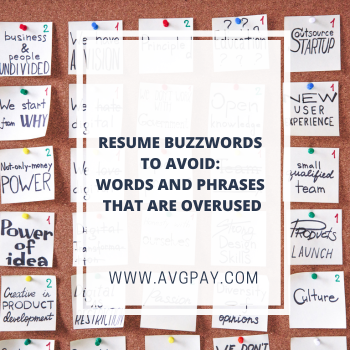When writing a resume, the words you choose are the connection between your experience and your future employer’s needs. They are not just a list of skills and job titles; they are a reflection of your professional identity. However, in the quest to impress, many job seekers fall into the trap of using overused buzzwords, diminishing the impact of their resumes.
This article aims to guide you through the process of resume writing, highlighting words and phrases to avoid and offering alternatives that truly capture the attention of hiring managers.
Take a moment to think about the recruiting process from a hiring manager’s point of view, They are inundated with resumes for every open position. They often spend mere seconds scanning each one before deciding who makes the cut. They simply can’t afford to give everyone the benefit of the doubt. This is why the choice of words becomes so important.
The right language can make your resume stand out, but overused phrases can make it blend into the sea of other applicants. Moreover, with the rise of applicant tracking systems (ATS), the words you choose can also determine whether your resume even gets in front of human eyes. These systems are programmed to pick up on specific keywords related to the job description, and missing these can mean your resume is overlooked.
The overuse of certain buzzwords like “team player,” “hard worker,” or “strategic thinker” has made them lose their impact. While these phrases might seem like they describe desirable qualities, they have become so common that they no longer serve to differentiate candidates.
Instead, they can make your resume seem generic and unoriginal. So it’s important to not focus on describing yourself with fancy words but to demonstrate how you embody these qualities through concrete examples and achievements.
In this article, we’ll explore the specifics of these overused buzzwords, explore what hiring managers are actually looking for, and provide you with the tools to express your professional experience in a way that is both authentic and effective.
Commonly Overused Resume Buzzwords

Resume writing is an artform. You need to balance the need to impress while avoiding the pitfall of clichés. A significant part of this balance involves steering clear of overused buzzwords.
These are words and phrases that, due to their excessive use by job seekers, have lost their impact and meaning in the eyes of hiring managers and recruiters.
Let’s start with some of the most commonly overused resume buzzwords:
Team Player
While teamwork is crucial in most jobs, simply stating you are a team player is vague. It’s more effective to demonstrate how you’ve contributed to a team’s success.
Hard Worker
This is another subjective term that doesn’t convey specific skills or achievements. It’s better to illustrate your work ethic through concrete examples.
Strategic Thinker
This phrase is often used but rarely substantiated with examples. Detailing situations where your strategic thinking made a difference can be more impactful.
Detail-Oriented
Instead of just claiming attention to detail, highlight instances where your meticulousness brought value to a project or task.
Self-Motivated
This term is too generic. Discussing how you initiated a project or solved a problem independently can showcase self-motivation more effectively.
Effective Communicator
Instead of simply stating that you are an effective communicator, provide examples of presentations you’ve delivered, reports you’ve written, or instances where your communication skills positively impacted a project or team collaboration.
Results-Driven
Instead of using this vague term, highlight specific achievements and quantify results. For example, mention how you exceeded sales targets by a certain percentage or improved a process that resulted in time or cost savings.
Innovative
Rather than just claiming to be innovative, showcase specific instances where you introduced creative solutions, implemented new ideas, or played a key role in driving innovation within a team or project.
Problem Solver
Instead of stating you are a problem solver, provide concrete examples of challenges you’ve faced and the strategies you employed to overcome them. Highlighting specific problem-solving skills will make your resume more compelling.
Multitasker
Instead of using the term “multitasker,” provide examples of situations where you successfully managed multiple projects or tasks simultaneously. Emphasize how your organizational skills allowed you to handle diverse responsibilities effectively.
These words and phrases, while not inherently bad, become ineffective when used without context. The key is to replace these vague descriptions with specific, concrete examples that demonstrate your skills and achievements. For instance, instead of saying you’re a “hard worker,” describe a challenging project you completed on time or an instance where your extra effort led to a significant achievement for the company.
What Hiring Managers Want to See

Understanding the perspective of hiring managers is important in crafting a resume that stands out. They are looking for candidates who not only fit the job description but also bring unique value to the team and company.
Firstly, hiring managers appreciate resumes that are tailored to the specific job role. This means going beyond a one-size-fits-all approach and customizing your resume to align with the job description. For instance, if the job emphasizes leadership skills, provide examples of your leadership experiences and the positive outcomes that resulted from your direction.
Secondly, action verbs are your allies. They bring energy and clarity to your resume, painting a clear picture of your capabilities. Phrases like “led a team,” “initiated a project,” or “increased sales by X%” are far more impactful than generic terms like “responsible for” or “involved in.” These action-oriented phrases demonstrate your active role in achieving results.
Another important aspect is the use of concrete examples and quantifiable achievements. Instead of stating that you are a “hard worker,” describe a situation where your hard work led to a significant accomplishment, such as completing a major project under budget or ahead of schedule. Quantifiable achievements, like “increased revenue by 20%” or “reduced processing time by 30%,” provide clear evidence of your impact.
Hiring managers also value clarity and conciseness. A resume cluttered with jargon and unnecessary details can be off-putting. Use clear, concise language and bullet points to make your achievements easy to read and understand. This approach shows respect for the hiring manager’s time and makes it easier for them to see your value.
Finally, your resume is not just a list of past jobs; it’s a marketing tool for your professional brand. It should reflect your unique strengths and the specific value you bring to the potential employer. By focusing on what hiring managers are looking for and presenting your experiences and skills in a clear, concise, and relevant manner, you can create a resume that truly stands out.
Power Words and How to Use Them
Power words are the secret sauce that can take your generic resume to the next level. These are also known as an action verb that can vividly illustrate your accomplishments and skills, giving hiring managers a clear picture of your professional experience.
When using power words, it’s important to be selective. So look for words that accurately describe your experiences and achievements. For example, instead of saying you “worked on” a project, say you “spearheaded” or “orchestrated” it. These words convey leadership and initiative. If you improved a process, words like “enhanced,” “refined,” or “optimized” can be more descriptive than simply saying you “changed” it.
Power words are most effective when used in the context of specific achievements. For instance, rather than stating you are a “successful manager,” illustrate this by saying you “led a team of 10 and increased department productivity by 25%.” This not only shows that you are a leader but also provides measurable evidence of your success.
It’s important to vary your resume action verbs to keep your resume engaging. Using the same few words repeatedly can make your resume monotonous. Additionally, ensure that the power words you choose are relevant to the job you’re applying for. Tailoring your language to reflect the skills and experiences the job listing emphasizes can make your resume more attractive to potential employers.
While power words can enhance your resume, you need to balance them with simple, clear language. Overusing complex or technical jargon can make your resume difficult to understand. The goal is to strike a balance where your achievements stand out without overwhelming the reader.
Tailoring Your Resume to the Job Description

One of the most effective strategies in resume writing is tailoring your document to align closely with the job description. This approach not only increases your chances of getting past applicant tracking systems (ATS) but also demonstrates to hiring managers that you have taken the time to understand and respond to the specific requirements of the job.
Analyzing the Job Description
Start by thoroughly reading the job listing and identifying key skills, experiences, and qualifications required for the role. Pay special attention to recurring themes or specific language used in the description. These are likely the primary competencies the employer is seeking.
Matching Your Skills and Experiences
Once you have a clear understanding of what the job entails, review your own skills and experiences to find matches. For each requirement listed in the job description, think of an instance where you’ve demonstrated that ability or accomplishment. This is where you can use power words and concrete examples to show how your experiences align with the job requirements.
Incorporating Keywords
ATS are designed to scan resumes for keywords that match the job description. Ensure that your resume includes these keywords. However, it’s important to use them naturally and in context. For example, if the job description emphasizes “project management,” your resume should include specific examples of your project management experience.
Highlighting Relevant Achievements
Focus on achievements and experiences that are most relevant to the job. If the role requires leadership skills, highlight your leadership experiences and the positive outcomes you achieved. Tailoring your achievements to match the job description makes it easier for the hiring manager to envision you in the role.
Avoiding Overstuffing
While it’s important to include relevant keywords and skills, avoid the temptation to overstuff your resume. Your resume should still be a truthful representation of your skills and experiences. Overstuffing can make your resume look contrived and may even raise red flags for hiring managers.
Showcasing Your Skills and Achievements

Your resume is more than a summary of your job history; it’s a way to showcase your most significant skills and achievements. Here’s how:
Using Concrete Example
The most impactful way to demonstrate your skills is through specific, concrete examples. Instead of saying you’re a great team player, describe a situation where your teamwork skills led to a successful project outcome. For instance, “Collaborated with a cross-functional team to develop a new product feature, resulting in a 15% increase in customer satisfaction.”
Quantifying Achievements
Whenever possible, quantify your achievements with numbers, percentages, or other measures. This provides a clear and objective picture of your contributions. For example, “Increased sales by 20% over six months” is more impactful than “Increased sales significantly.”
Highlighting Problem-Solving Skills
Employers value candidates who can identify problems and come up with effective solutions. Highlight instances where you’ve successfully tackled challenges. For example, “Identified a recurring issue in the production process and implemented a solution that reduced error rates by 30%.”
Showcasing Leadership and Initiative
Even if you’re not applying for a leadership role, demonstrating leadership skills can be a significant advantage. Include examples of times when you took the initiative, led a project, or motivated a team. For example, “Led a volunteer team in organizing a company-wide charity event, raising over $10,000.”
Customizing Your Achievements
Tailor your achievements to the job you’re applying for. Focus on the skills and experiences that are most relevant to the position. This shows the employer that you’re not just qualified, but also a good fit for the specific role.
Final Tips for a Professional Resume
As we conclude, let’s focus on some final tips to ensure your resume is not only professional but also stands out in a competitive job market. Here’s how you can refine and polishing your resume to make a strong, lasting impression.
Keep It Concise and Relevant:
Your resume should be a concise summary of your professional experiences and skills. Aim for a maximum of two pages, and ensure every word adds value. Avoid including irrelevant job experiences or personal details that don’t contribute to your professional narrative.
Use a Clean, Professional Format
The layout of your resume should be clean and easy to read. Use a professional font, ensure adequate spacing, and organize your content with clear headings. A well-formatted resume not only looks professional but also makes it easier for hiring managers to find the information they need.
Proofread and Edit
Typos and grammatical errors can be a major turnoff for employers. Proofread your resume multiple times and consider having someone else review it. This can help catch errors you might have missed and ensure your resume is polished.
Update Regularly
Keep your resume updated with your latest skills and experiences. Regular updates ensure that you’re always ready to apply for new opportunities and that your resume accurately reflects your current professional status.
Customize Your Cover Letter
While your resume is about your professional experiences, your cover letter is an opportunity to express your interest in the specific job and company. Tailor your cover letter for each application to show your enthusiasm and how your skills align with the job requirements.
There you have it. We hope you enjoyed this article. Hopefully, you’re now in a better position of creating a resume that converts. For more advice on the job search and hiring process, feel free to browse the rest of our site..





